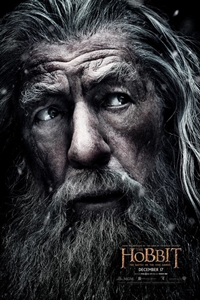 The Hobbit: The Battle of the Five Armies
The Hobbit: The Battle of the Five Armies
Starring Martin Freeman, Richard Armitage, Luke Evans, Evangeline Lilly, Lee Pace, Ian McKellen, and Orlando Bloom
Directed by Peter Jackson
Rated PG-13
Run Time: 144 minutes
Genre: Fantasy/Action-Adventure
Opens December 17th
By Eric Forthun of Cinematic Shadows
The Hobbit: The Battle of the Five Armies is the most resonant film in the exasperatingly long series based on the J.R.R. Tolkien novel. As an expansion of the world established in the early 2000s by Peter Jackson's astounding Lord of the Rings trilogy, the latest film encapsulates all of the series' strengths and weaknesses. It's become obvious over the past two years that the decision to make The Hobbit into a trilogy has been creatively ambitious if overly manipulative of the audience's desire to complete the emotional journey. The fact that this entire final film is based around a single set piece and acts as a gigantic, compelling action sequence is remarkably stubborn and simplistic. Yet more so than the previous two entries, the film delivers the best dramatic punch of the bunch, while surprisingly delivering on satisfying character arcs and thrilling action pieces. Jackson has closed out the franchise on a high note, one that compels, moves briskly, and makes the audience forget for a bit that the series doesn't warrant almost 8 hours worth of screen time.
The film picks up with Smaug's escape from his kingdom of treasure and the possibility of him destroying all of Middle-Earth. Fortunately, the people of Laketown have Bard (Luke Evans) as a savior, for he takes down the magnificent beast and prepares the town for the next fight. Bilbo Baggins (Martin Freeman), Thorin Oakenshield (Richard Armitage), and company stand their ground in the Lonely Mountain as they observe from the outside; Thorin's obsession with finding the Arkenstone, a legendary Dwarfish relic, has driven him to borderline madness, with the other dwarves attempting to prepare for the ensuing battle. Azog, an Orc leader, leads his army on a march to the Lonely Mountain, and hears of an Elvish army marching toward the city as well. All of them have a claim to the wealth lying in those chambers. Meanwhile, Gandalf (Ian McKellen) is still imprisoned and finds a savior in Galadriel (Cate Blanchett), who also must deal with the emergence of Sauron. And assisting Bard and the dwarves in their fight for their lives is Legolas (Orlando Bloom) and Tauriel (Evangeline Lilly).
While the film remains busy with all of these subplots, they come together in a suitable fashion. The combination of all of these forces, and their titular five armies, amounts to an epic conclusion for the trilogy. There's a human connection within each of the narratives: the plea for survival in the wake of tragedy in Bard's journey; the Elvish divide between Tauriel and her true love, a dwarf; Thorin's descent into madness as his desire for power and title outweigh his need for his race's survival; while Gandalf must face the greater evil force that will overtake the kingdom without any way of stopping him. This is a bleak vision for Middle-Earth, one that we haven't quite seen from Jackson. It's a world overcome with loss and grief; there are some traumatically affecting scenes here that bring together the underlying themes of the new series. Even if the time spent per page in this franchise is extensively bigger than the previous trilogy, that has allowed Jackson and his screenwriters to build these characters to satisfying payoffs. There are deaths here that finally have an impact. We care about these people.
There's also something remarkable about the characterization of Tauriel: she's a badass heroine that holds her own and is a strong presence on screen. She's the best character in the franchise, a woman marked by conflict from her own race that tells her she cannot have an impure love. An outstanding battle between her and an Orc commander leads to some of the most striking conflict in the series: as she seemingly appears to be the "damsel in distress," the scene turns and uses the male as the person in trouble. It makes the film tremendously exciting and unpredictable. The battles that make up the final hour of the film are wholly exciting, too, and shot beautifully. It's unfortunate that there's unnecessary filler, particularly with a comic relief character that never feels properly placed in the narrative. It's off-putting and drags the scenes with actual human conflict. Nonetheless, as a closer to a hit-and-miss trilogy with a painfully long running time, The Hobbit: The Battle of the Five Armies ends in a fittingly epic, satisfactory conclusion for fans.









